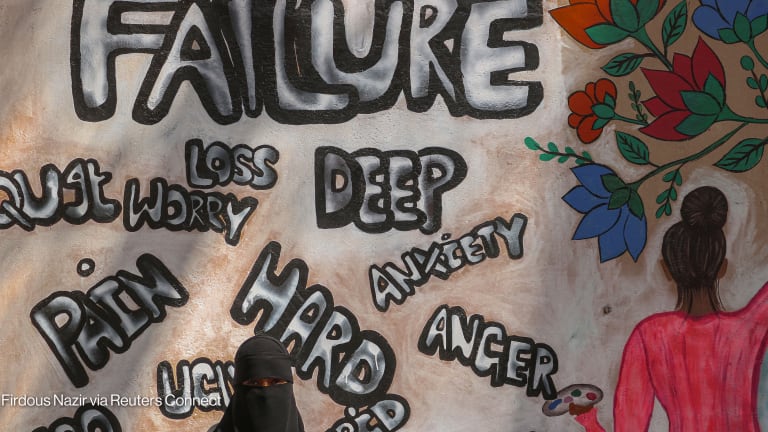
Even before COVID-19, the world was not equipped to respond to the mental health needs of its populations. Mental health and substance-use conditions are the global leading cause of years lived with disability, 1 in 5 of the world’s children have a mental health condition, and suicide is the second-leading cause of death among those aged 15 to 29. COVID-19 is set to exacerbate this situation.
The enormous human cost of mental health ought to itself galvanize government investment. But the unique economic costs — and potential benefit of investment — combined with the need to address the impact of COVID-19 on society, only strengthen the case for financing mental health. As finance ministers attend the annual meetings of the International Monetary Fund and World Bank this month, now is the perfect time to increase human capital through investment in mental health.
COVID-19 and mental health
World Health Organization evidence released this month stated that COVID-19 has disrupted or halted critical mental health services in 93% of countries, while the demand for mental health is increasing. Although 89% of countries have mental health included in COVID-19 response plans, only 17% of those have the funding required.
There are reports in many countries of rising demand for mental health support. Moreover, poor mental health typically rises during economic recession. At precisely the time when the world most needs mental health support, the systems and safety nets are being removed.
Mental ill health can increase the risks of viral spread for pathogens such as the coronavirus. The link between poor mental health and lower compliance with medical treatment and guidance is well established.
Opinion: In the time of COVID-19, we need to invest in a different mental health system
The “illness” model of mental health isn’t working, but the West is exporting it around the globe — with little attention paid to context, local knowledge systems, or cultural norms, according to this op-ed.
Not integrating mental health into pandemic responses can lead to “reservoirs” of continued infection where neglected populations — such as those in mental institutions or homeless people — are unable to access public health measures. People with mental health conditions are also less likely to take up vaccinations themselves or for their children, which will significantly hamper efforts to fight COVID-19.
To end the COVID-19 pandemic quickly and build systems more resilient to future public health emergencies, mental health needs to be placed at the center of national and global COVID-19 response plans and be properly funded, as called for by the United Nations secretary-general in May and supported by 95 member states in June.
The case for investment
Regardless of a pandemic, mental health and economic performance are interlinked. Globally, nearly 1 billion individuals are living with a mental health condition. In some economies, around 20% of the working population has some form of mental health issue at any time.
Each year, 12 billion productive days are lost due to depression and anxiety alone, contributing to economic output losses from $2.5 trillion to $8.5 trillion. Those figures are projected to nearly double by 2030. These are losses no country can afford — let alone at a time of economic uncertainty.
The cost of helping improve mental health is comparatively small. For example, to provide a comprehensive package of schizophrenia, depression, epilepsy, and alcohol-use interventions in sub-Saharan Africa and South Asia, just $3-$4 per capita would be required annually.
Scale-up and integration of mental health across government systems is urgently needed to accelerate economic growth.
—Moreover, scaling up treatment for mental disorders generates meaningful health, social, and economic benefits that any finance ministry would be proud of. For example, for every $1 invested in scaled-up treatment for common mental issues, there is a return of around $4 in improved health and productivity. This can be much larger when including the full impact on an individual’s lives and their communities, businesses, economies, and society at large.
Yet such help is scarce. In low- and middle-income countries, 76%-85% of people with a mental health issue receive no care at all. This is largely because governments allocate on average less than 2% of health budgets to mental health. This drops to less than 1% in low-income countries. Governments simply do not prioritize mental health.
Increasing expenditure on mental health to the recommended 5%-10% of total health expenditure would increase service coverage by 40%-80%, depending on the resource setting. This would represent substantial growth in resources committed to mental health.
Efforts to address mental health globally are usually aimed at leaders in the health sector. However, progressive and effective approaches to improving mental health are cross-sectoral, integrating mental health promotion and treatment into not just health systems but also education, justice systems, social welfare, and workplaces, as well as addressing social determinants of poor mental health.
This coordinated and collaborative approach requires strong government leadership that can be facilitated by finance ministries as part of the strategic, cross-governmental approach they commonly employ.
Now more than ever, it’s time to act
Opinion: Now is the time to prioritize mental health
The COVID-19 emergency offers a renewed chance to prioritize psychosocial services — for some of the world’s most vulnerable.
Mental health is a public good and is interwoven throughout society. Supporting good mental health promotes the ability of everyone to fully participate in society, whether in communities, workplaces, schools, or families.
The current low levels of mental health resources and the potentially enormous positive impacts make mental health ripe for catalytic investment. To ensure sustainability and allow for a cross-governmental approach, this funding should come from domestic financing and, where needed, international donors such as the World Bank.
The Global Financing Facility has a particularly critical role as a leading funder of child and maternal health. Finance ministries are often the gatekeepers here, with the power and unique opportunity to unleash historic change.
The economic impact of poor mental health is simply too large to be ignored. Scale-up and integration of mental health across government systems is urgently needed to accelerate economic growth. In addressing COVID-19, investment in mental health — and health in general — will be critical to return economies to sustainable growth.






